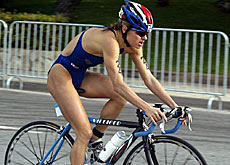Triathlon elite come to Lausanne

This weekend Lausanne, the headquarters of the International Olympic Committee, is hosting the triathlon world championships for the second time.
But a lot has changed since the city hosted the event in 1998. The triathlon, an Olympic sport since 2000, has become much more professional, posing a greater challenge for organisers.
“It all began with a slightly mad bet made by a group of police officer friends who decided to organise a demonstration event for the public. That’s how we launched Lausanne’s first triathlon 12 years ago,” explained Claude Thomas, vice-president of the 2006 world championships organising committee.
“By 1998 we were organising the world championships, but that event has nothing in common with the one today.”
In eight years the triathlon – a 1.5km swim followed by a 40km road cycling race followed by a 10km run – has become much more professional and organisers have had to work hard to keep up with the new demands.
On September 16, 2000 the triathlon became an Olympic sport at the Sydney games – fond memories for Swiss athletes Brigitte McMahon and Magali Di Marco Messmer, who swam, cycled and ran away with the gold and bronze respectively.
Then at the 2004 Athens Olympics Sven Riederer picked up bronze.
However McMahon’s achievements were tarnished when she tested positive for EPO doping during a competition in June 2005. She promptly retired.
Swiss participation
After a three-year break, Di Marco Messmer is hoping to pip the two main favourites Vanessa Fernandez from Portugal and Joelle Franzmann from Germany.
“Since I returned in 2003, the course in Lausanne is the one I’m best prepared for,” said the 34-year-old from Neuchâtel, who wants to be on top form for the 2008 Summer Olympics in Beijing.
But her compatriot Nicola Spirig, who came 19th in Athens, won’t take part in Lausanne having suffered a stress fracture of her tibia (shin bone) last month.
Among the men, Australian Brad Kahlefeldt and American Hunter Kemper are the favourites, but Swiss success isn’t out of the question.
Riederer, former European champion Reto Hug and former world champion Olivier Marceau will be hoping to benefit from home advantage.
“The Swiss athletes have been training a lot on the world championship course,” said Claude Thomas. “They’re ready – and the public will be behind them 100 per cent. I think they could deliver a surprise.”
In particular the windy, up-and-down terrain – the organisers decided to maximise Lausanne’s topography – could be to their advantage.
What’s more, the various turns and loops that the athletes will have to tackle will enable the thousands of spectators to follow every minute of the race.
swissinfo, Mathias Froidevaux
Triathlon encompasses three sports: swimming, cycling and running.
Each sport takes its distance from existing events already on the Olympic programme (1.5km swim, 40km road cycling race and 10km run).
Triathlon was invented in the early 1970s by the San Diego Track Club and made its Olympic debut in the Sydney 2000 summer games.
The Lausanne triathlon world championships have a budget of SFr1.5 million ($1.2 million). Prize money is SFr300,000.
About 4,000 participants are expected – including 180 “elite” men and women.
The Swiss elite athletes are Sven Riederer, Olivier Marceau, Reto Hug, Mike Aigroz, Sébastien Gacond, Magali Di Marco Messmer and Sibylle Matter.

In compliance with the JTI standards
More: SWI swissinfo.ch certified by the Journalism Trust Initiative











You can find an overview of ongoing debates with our journalists here . Please join us!
If you want to start a conversation about a topic raised in this article or want to report factual errors, email us at english@swissinfo.ch.